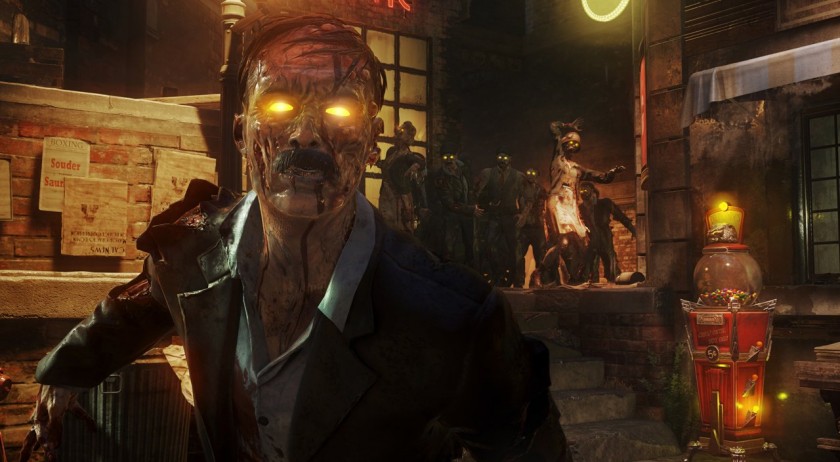If anyone in your household is a console gamer, chances are Call of Duty: Black Ops 3 is either on their game shelf or on their wishlist—even if they aren’t old enough to play a game rated Mature.
Though the general popularity of first person shooter games (FPS) has declined slightly in recent months, the Call of Duty franchise remains a leviathan of the gaming industry, occupying top spots in sales tallies year after year. Black Ops 3, the newest installation in the Call of Duty franchise, is expected to rake in an astonishing $1 billion in sales by the end of 2015.
All these numbers are good for Activision, the developer behind Black Ops 3, but is this M-rated game that so many find entertaining (even addictive), actually any good for players’ brains?
Without getting into the debate over mature content [LW4K president Dr. Randy Kulman addresses the issue of violent video games like Backs Ops 3 and younger children in this recent post], let’s take a look at the effects of FPS and action games on cognitive skills. This is your brain on Black Ops 3.
[cjphs_content_placeholder id=”73595″ random=”no” ]Plastic explosives or plastic brains?
LearningWorks for Kids has long been a proponent of video games of all kinds for their positive benefits to executive functions and the way they can boost real world skills. Though we don’t necessarily recommend M-rated games to our target audience (14 and younger), Black Ops 3 does call upon all of the major thinking skills—focus, planning, flexibility, working memory, time management, self-awareness, and self-control. Players must follow directions, stay on task, pay attention to their surroundings, plan their movements, change strategies and weapon loadouts, work within time limits, know where they stand in relation to hazards and enemies, and not shoot at everything that moves.
Additionally, a study published just this past October finds that playing action and FPS games like those in the Call of Duty series can actually boost brain plasticity. That means playing hectic games that require quick thinking and decision making can actually help your brain grow, learn, and reorganize better and faster.
Bullet-proof memory
Another study, published just this month, has—not surprisingly—found that games in which players navigate three-dimensional environments can boost memory. Researchers report that participants (who were not previously video game players) who were tasked with exploring 3D virtual worlds performed 12% better on memory tests. Interestingly, this is pointed out by the researchers as the same amount of memory that is lost by most people between the ages of 45 and 75.

This is your brain on Black Ops 3: learning to be part of a team and getting a sense of connectedness and purpose. Surprising, huh?
A feel-good game?!
The language in the Black Ops 3 single-player campaign alone is rough, but in the tense online multiplayer matches, cursing isn’t the only thing to worry about. Name-calling, blaming, and shaming–an unfortunate reality of Internet anonymity in general—are not uncommon. If you eliminate the negative, however (which is possible if a group of friends who treat each other with respect form a party and use the separate party chat to communicate), the game offers surprising benefits in the realm of positive psychology. Interacting with others and working together toward a common goal increases self-awareness, flexibility, and self-control, encourages gratitude, empathy, a sense of purpose, and connectedness, and helps exercise communication skills.
Those positive psychological benefits aren’t just dependent upon social interaction, either. A player could easily take their chat headset off and still benefit from the self-assessment and cognitive reframing needed to win games and improve leaderboard standings. The nature of a versus mode makes constantly changing dynamics of playing styles and abilities a reality; a method that worked once on a certain map won’t necessarily work with a different combination of players. Self-control must be practiced, as well, because running around wildly and not taking the time to take stock or aim a weapon will make you a less effective member of the team.
We here at LearningWorks for Kids are here to offer expert advice and recommendations; we are not the parent police. We don’t believe that any game has the ability to turn a child into a zombie, especially not with the proper parental guidance. We do, however, urge families to consider the violent content and strong language in Black Ops 3, and whether children—particularly younger children and those with emotional considerations–are able to compartmentalize what they see on the screen and separate it from reality. If you do have an older child or teen who wants to play the game (or you have difficulty keeping away from the game), please know that the content of Black Ops 3 and the skills used in the game are best digested and translated by your kids when you talk about them together.





“I’m gone to say to my little brother, that he should also pay
a visit this website on regular basis to take updated from hottest
reports.”
Very nice post. I just stumbled upon your blog and wanted to say that I’ve really enjoyed browsing your blog posts. In any case I’ll be subscribing to your feed and I hope you write again soon!
Nice post. I was checking constantly this blog and I am impressed! Very useful info specifically the last part 🙂 I care for such info a lot. I was looking for this particular info for a long time. Thank you and good luck
Very nice post. I just stumbled upon your blog and wanted to say that I’ve really enjoyed browsing your blog posts. In any case I’ll be subscribing to your feed and I hope you write again soon!
I’ve been browsing online more than three hours today, yet I never found any interesting article like yours. It’s pretty worth enough for me. Personally, if all website owners and bloggers made good content as you did, the internet will be a lot more useful than ever before